Independent Contractor Agreement (Maine): Free template

Independent Contractor Agreement (Maine)
An Independent Contractor Agreement is a legally binding contract between a business and an independent contractor, outlining the terms of their working relationship. In Maine, this type of agreement is essential for businesses that rely on freelancers, consultants, or specialized service providers to complete projects or tasks. The agreement ensures clarity regarding the scope of work, payment terms, timelines, intellectual property rights, and alignment with state-specific labor laws.
Maine’s economy is driven by industries such as healthcare, education, tourism, and manufacturing, suited for businesses that frequently engage independent contractors. However, navigating Maine’s labor laws, including those governing worker classification under the Maine Department of Labor guidelines, is critical. Misclassifying an employee as an independent contractor can result in significant penalties, including back wages, fines, and legal disputes. A well-drafted Independent Contractor Agreement not only protects both parties but also strengthens adherence to these laws.
For example, a Maine-based tech startup might use an Independent Contractor Agreement to hire a software developer for a specific project, while a marketing agency might engage a freelance graphic designer. This type of agreement is particularly valuable for businesses looking to maintain flexibility in their workforce while minimizing risks associated with misclassification.
Tips for drafting and maintaining an Independent Contractor Agreement in Maine
- Clearly define the scope of work: Specify the tasks, deliverables, and deadlines expected from the contractor. For instance, if hiring a web developer, detail the functionalities required, milestones, and final delivery date.
- Include detailed payment terms: Outline how and when the contractor will be paid. For example, specify whether payment will be made upon completion of the project or in installments tied to milestones. Include any late payment penalties if applicable.
- Address intellectual property rights: Clearly state who owns the intellectual property created during the project. For example, specify that all work product becomes the company’s property upon full payment.
- Strengthen alignment with Maine labor laws: Ensure the agreement explicitly states that the contractor is not an employee. Include provisions that align with Maine’s worker classification laws, such as the absence of employee benefits, withholding taxes, or employer control over how the work is performed.
- Include termination clauses: Define how either party can terminate the agreement and what happens upon termination, such as returning materials or completing outstanding tasks.
- Regularly review and update: Periodically review the agreement to ensure it remains aligned with changing laws or reflects updates to your business operations. For example, if new regulations regarding remote work or data privacy are enacted, update the agreement accordingly.
Frequently asked questions (FAQs)
Q: What should an Independent Contractor Agreement include in Maine?
A: It should include a clear description of the scope of work, payment terms, intellectual property rights, confidentiality clauses, and alignment with Maine labor laws. Additionally, specify how disputes will be resolved and include termination provisions.
Q: How does Maine law impact Independent Contractor Agreements?
A: Maine law emphasizes proper worker classification. Misclassifying an employee as an independent contractor can lead to penalties under state and federal laws. Businesses must ensure the agreement reflects the contractor’s independence, such as lack of employer control over work methods and no provision of employee benefits.
Q: Can an Independent Contractor Agreement limit liability in Maine?
A: Yes, an Independent Contractor Agreement can include clauses that limit liability for issues such as delays, errors, or damages. However, these clauses must be reasonable and clearly stated to be enforceable.
Q: What industries commonly use Independent Contractor Agreements in Maine?
A: Industries like technology, healthcare, construction, and creative services frequently use Independent Contractor Agreements in Maine to engage specialized talent while maintaining flexibility in their workforce.
Q: How can businesses strengthen alignment with Maine laws in Independent Contractor Agreements?
A: Businesses should consult legal professionals to ensure their agreements reflect Maine’s labor laws and federal regulations. Regularly reviewing and updating the agreement to reflect changes in laws or business needs is also essential.
This article contains general legal information and does not contain legal advice. Cobrief is not a law firm or a substitute for an attorney or law firm. The law is complex and changes often. For legal advice, please ask a lawyer.


